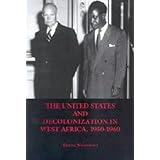
Average Reviews:

(More customer reviews)This is a useful book mainly because it offers a rare African perspective on U.S. policy. The most valuable sections are the Ghana and Guinea case studies, which offer a wealth of information from sources rarely consulted in the U.S. There's also an interesting narrative of U.S. Africa policy in the 1940s and early 50s drawn from a wealth of official sources.
Nwaubani falls short, however, in his analysis of U.S. Africa policy, especially in the late in the 1950s. Since the work concentrates on official sources, it is disappointing that the author has seriously mistaken the role of Vice President Richard Nixon in promoting a sophisticated, realistic Africa policy in support of decolonization. Instead, the book dismisses Nixon as a "racist," using no sources other than Watergate tapes made fifteen years and more afterward. He makes no effort to examine Nixon's strong, consistent support for civil rights over decades at a time when few national figures did so. In fact, it was Nixon's constant needling in the 50s that prompted the State Department to take decolonization seriously, to support and immediately recognize new governments, and to open up embassies throughout Africa.
There's also a failure to grasp and explain the larger forces that molded U.S. policy, despite a brief final chapter that serves as a sort of afterthought. Nixon embodied American anti-communism and understood the changing face of race relations. But Africa had a constituency even half a century ago. It was in African American institutions that had been reaching out to the continent for a century or more. It was in churches - black and white - that had sponsored missions for a century. And it was in the budding civil rights movement. Martin Luther King, Jr., went to Ghana's independence celebrations because he represented a movement that intimately saw the link between Africa and the status of African Americans.
One huge gap is incomprehensible. That's the complete absence of any mention of Ralph Bunche. Bunche was the premier American Africanist of the mid-twentieth century, a scholar/activist who researched in and wrote his Harvard dissertation on West Africa, then built up from scratch Howard University's African studies program. He also wrote much of Gunnar Myrdal's landmark study of U.S. race relations, American Dilemma (1944), which served as a intellectual roadmap for the next twenty years of the civil rights movement. He worked at the State Department and then spent the rest of his career at the UN - 1945 until shortly before his death in 1971. He pushed the UN and US aggressively and successfully to advance the timetable for decolonization. It was not mere chance that Bunche, King, and Nixon were all in Accra to celebrate Ghana's independence. Yet one will read this book and walk away without any sense of the role of these men and the forces they personified in the U.S.-Africa relationship.
Click Here to see more reviews about: The United States and Decolonization in West Africa, 1950-1960 (Rochester Studies in African History and the Diaspora)
As an investigation of America's response to the decolonization process in West Africa, The United States and Decolonization in West Africa, 1950-60 fills several important gaps. The history of America's involvement in Africa remains understudied. This book focuses on a neglected decade when the 'wind of change' swept across Africa.Critical of the traditional 'nationalist' interpretation of the decolonization process in Africa, the author begins his book by placing the transition of British and French West African territories to statehood with a neocolonialist framework. In doing so, he abandons the conventional definitions and usages of 'independence' and 'decolonization', and makes a compelling case that these are two related but different phenomena. Nwaubani argues that the United States was not a catalyst in the transition process in West Africa, but rather acted in a neocolonialist fashion itself. He also gives a nuanced appraisal of the Cold War, demonstrating that it was not as important as popularly believed in determining US behavior in Africa. The primary focus of the book in on West Africa, with case studies focusing on the Ewe, Ghana (including the Volta dam project), and Guinea. But the broad issues discussed are framed in the larger context of sub-Saharan Africa, and against the backdrop of the larger debates about the nature of post-1945 United States diplomacy. Ebere Nwaubani is a member of the History Department, University of Colorado at Boulder.

No comments:
Post a Comment